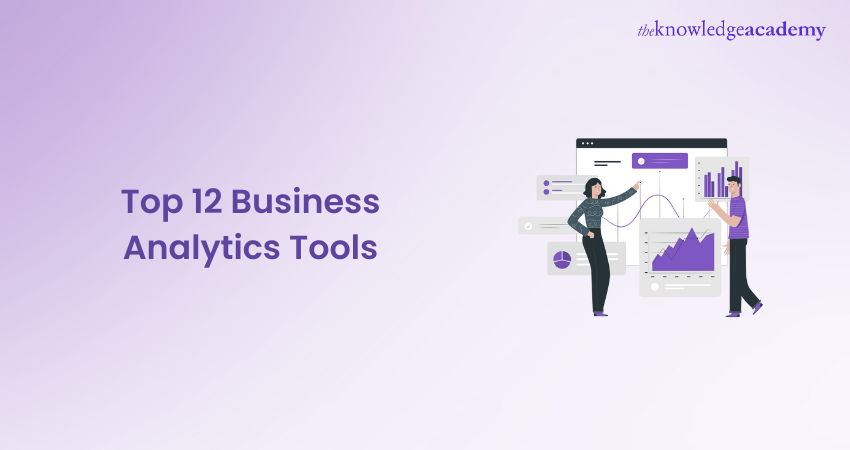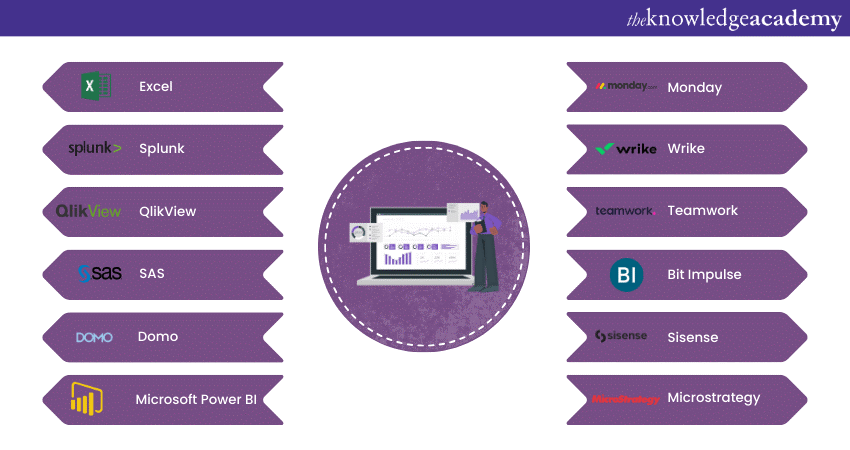We may not have the course you’re looking for. If you enquire or give us a call on +43 720 115337 and speak to our training experts, we may still be able to help with your training requirements.
Training Outcomes Within Your Budget!
We ensure quality, budget-alignment, and timely delivery by our expert instructors.

Business Analytics Tools are important for organisations to gain valuable insights using existing data. These tools help in data collection, data analysis, and data visualisation. It also helps in identifying trends, patterns, and opportunities for growth of the organisation.
As per the information from Statista, Data Analytics market will grow at an annual compound rate of 30% by 2025. This is because businesses prefer data-driven decisions to bring changes in the organisation. This shows the importance of having Business Analytics Tools that offer organisations useful insight to build customer interaction. Read this blog to learn about the Top 12 tools that can help you build your business with better decisions. Happy learning!
Table of Contents
1) Importance of Business Analysis
2) Top 12 Business Analytics Tools
a) Excel
b) Splunk
c) QlikView
d) SAS
e) Domo
f) Microsoft Power BI
g) Microstrategy
h) Sisense
i) Bit Impulse
j) Teamwork
k) Wrike
l) Monday
3) Conclusion
Importance of Business Analysis
Business Analysis is a vital process for organisations to improve efficiency and effectiveness. The analysis involves creating practical solutions by understanding company requirements and addressing challenges. It also includes submitting essential documentation, allocating sufficient resources, identifying fresh opportunities and making wise commercial decisions.
Also, Business Analysis improves the technical needs of organisations in a very short timeframe. Ultimately, it results in delivering benefits to stakeholders and enhancing how businesses operate. Therefore making it an essential practice for organisational growth and success.
Sign up for the IIBA Certification of Competency in Business Analysis (CCBA) Course now!
Top 12 Business Analytics Tools
With such a huge significance of Business Analysis, it’s crucial to have certain tools at hand to make the process easier and more efficient. Business Analysts use statistical tools that combine both qualitative and quantitative data from various systems and categorise them into a repository. Here’s a list of top Business Analytics Tools recommended to have in today’s data-driven world:

1) Excel
Excel remains the most compatible tool for Business Analytics among the various Business Analytics Tools in the market. It is affordable and user-friendly. With its robust capabilities, such as form creation, PivotTable, VBA, and scalability for both small and large datasets, Excel is highly versatile.
Moreover, its simple interface allows professionals from any background to easily handle it. As a result, it has become a widely embraced choice for data analysis. It also features advanced analytics tools such as time grouping and automatic relationship detection.
2) Splunk
Splunk Technology is known for its creation of diverse tools to handle various aspects of machine-generated data. It includes searching, monitoring, and analysis. It efficiently captures, indexes, and establishes correlations in real-time data. This enables users to access a searchable repository. This repository serves as a very useful feature for generating graphs, reports, dashboards, etc.
Splunk offers a free version called Splunk Free, which allows users to use the features of Splunk 4 for two months. This comes with the added advantage of indexing 500 megabytes of data daily. It also caters to the needs of small and medium-scale industries.
Prepare for the Business Analysis Certification by signing up for the IIBA Entry Certificate in Business Analysis (ECBA) Course now!
3) QlikView
Qlik, a business analysis and software company which introduced QlikView. QlikView is famous for Business Analytics. Its quick response time sets it apart from other Business Analytics Tools. It is user-friendly, easily deployable, and provides insights through data association and identification of unrelated data.
Moreover, to operate this tool, no prior programming experience is necessary. It just requires basic SQL and VB Script knowledge. Qlik offers a free version for personal use, small startups and individual learners.
4) SAS
SAS is a statistical software suite designed for data management, advanced analytics, and predictive analytics. Its strong capabilities and user-friendly methodologies have gained widespread popularity in the analytics industry. It analyses large data sets in real time, simplifying the process.
SAS is a powerful platform that converts raw data into valuable information. Over time, SAS has expanded its offers with additional modules, increasing its capabilities for various applications such as SAS analytics for the Internet of Things (IoT), SAS anti-money laundering, etc.
5) Domo
Domo is a cloud-based Business Analytics platform that integrates various data sources. Its user-friendly interface and real-time data visibility offer both micro and macro-level insights. Therefore, it is the right choice for businesses of all sizes. As businesses mostly rely on data, the demand for skilled analysts and tools like Domo is rising.
Mastering Domo can open new opportunities to analyse data and make informed decisions for companies. It is designed in a way to help organisations find effective solutions with the data in hand.
Demonstrate your professional commitment to Business Analysis by signing up for our IIBA Certified Business Analysis Professional (CBAP) Course now!
6) Microsoft Power BI
Microsoft's Power BI is one of the popular Business Analytics Tools used mainly for data visualisation. It helps Business Analysts to create reports, dashboards, and Key Performance Indicators (KPIs) from complex data. Key features include various data visualisation charts, and compatibility with data sources like Excel, SQL server, text, PDF, CSV files, etc.
Dashboards display multiple visualisations and can be shared with other users. The Natural Language Q&A feature allows users to search for specific data or parts of the report easily.
7) MicroStrategy
MicroStrategy is one of the leading Business Analytics Tools that provides data discovery, data visualisations, and web services. It offers a variety of Business Analysis Techniques and can access data from multiple sources for analysis. It helps users create and share reports from anywhere, using any device. Operating MicroStrategy only requires a basic understanding of programming, data analysis, and SQL. It also offers methodical processing of unstructured text data.
8) Sisense
Sisense is a powerful business analytics tool that allows users to analyse and visualise large volumes of complex data. It is useful for both small and enterprise-level businesses. Its data-driven approach helps in decision-making and future trend forecasting.
The software easily collects data from various sources, allowing users to combine multiple data sets seamlessly. Sisense's exceptional performance in cloud analytics has gathered recognition from renowned industry experts such as Gartner and Dresner.
9) Bit Impulse
Bit Impulse's Business Analysis Tool (BAT) is a powerful tool designed to make the work of Business Analysts easier. With seamless integration with Microsoft applications like MS OLAP, MS Dynamics, SQL, and more, it gathers and organises a large volume of business data for analysis. The tool ensures data protection and confidentiality.
BAT provides the feature of automatically sending reports via email, easing the process of sharing valuable insights. It simplifies the data analysis process and enhances productivity and decision-making.
10) Teamwork
Teamwork is a user-friendly Task Management tool. It tracks time, budget, and progress. As one of the most popular Business Analytics Tools, it handles operations, reduces the need for unnecessary meetings and improves productivity. Key features include breaking down goals into manageable tasks and offering multiple views for monitoring.
With a free plan for smaller teams and affordable paid plans, businesses of all sizes can benefit from its capabilities. The Starter Plan costs £4.75, the Deliver Plan costs £7.92, and the Grow Plan costs £15.85 per user per month.
11) Wrike
Wrike stands out as a widely used business analytics tool preferred by Business Analysts due to its features that streamline and enhance Project Management from initiation to analysis and reporting. Its automation capabilities help to integrate with various applications. The AI Work Creation feature converts rough notes into subtasks, saving time and effort.
Wrike offers collaboration and accessibility with Android and iOS support. The pricing model includes a free plan for basic task management. Wrike offers two primary plans: Team Plan at £7.78 per month and Business plan at £19.7 per month.
12) Monday
Monday is a versatile tool that monitors the workflow of organisations. It allows one to track organisational performance and gain valuable insights for project management. Key features include collaboration, task automation, and accessibility to various applications like Google Calendar, Gmail, and Mailchimp.
The pricing offers a free plan for up to two users with basic features, while paid plans—Basic, Standard, and Pro are priced at £6.3, £7.94, and £12.7 per user per month, respectively. Large businesses also have the option of choosing custom plans by contacting Monday.
Conclusion
While the market offers many different Business Analytics Tools, the ones mentioned above stand out as the highly recognised ones. Regardless of the features of a specific tool, Business Analysts can choose these tools during the decision-making process of an organisation. Using them wisely and efficiently improves the quality of services your business offers.
Prepare for the IIBA Business Analysis by signing up for our IIBA Business Analysis Training now!
Frequently Asked Questions

SAS and SPSS focus on advanced statistical analysis and data modelling. At the same time, Tableau and Power BI emphasise data visualisation and interactive dashboards for business insights, catering more to decision-makers than data scientists.

Training includes mastering data handling, analytics concepts, and tool-specific skills like SQL, statistics, and visualisation techniques. Basic training suffices for entry-level tools, but advanced analytics requires more profound expertise in programming or statistical methods.

The Knowledge Academy takes global learning to new heights, offering over 30,000 online courses across 490+ locations in 220 countries. This expansive reach ensures accessibility and convenience for learners worldwide.
Alongside our diverse Online Course Catalogue, encompassing 19 major categories, we go the extra mile by providing a plethora of free educational Online Resources like News updates, Blogs, videos, webinars, and interview questions. Tailoring learning experiences further, professionals can maximise value with customisable Course Bundles of TKA.

The Knowledge Academy’s Knowledge Pass, a prepaid voucher, adds another layer of flexibility, allowing course bookings over a 12-month period. Join us on a journey where education knows no bounds.

The Knowledge Academy offers various IIBA® Business Analysis Training, including IIBA® Entry Certificate in Business Analysis (ECBA™) Course, IIBA® Certified Business Analysis Professional (CBAP®) Course and IIBA® Certification of Competency in Business Analysis (CCBA®) Course. These courses cater to different skill levels, providing comprehensive insights into Mind Map.
Our Business Analysis Blogs cover a range of topics related to Business Analysis, offering valuable resources, best practices, and industry insights. Whether you are a beginner or looking to advance your Business Analysis skills, The Knowledge Academy's diverse courses and informative blogs have you covered.
Upcoming Business Analysis Resources Batches & Dates
Date
 IIBA® Certified Business Analysis Professional (CBAP®)
IIBA® Certified Business Analysis Professional (CBAP®)
Thu 23rd Jan 2025
Thu 29th May 2025
Thu 24th Jul 2025
Thu 30th Oct 2025







 Top Rated Course
Top Rated Course



 If you wish to make any changes to your course, please
If you wish to make any changes to your course, please


